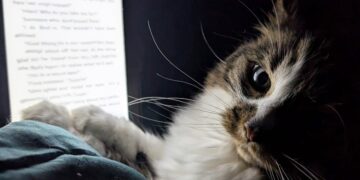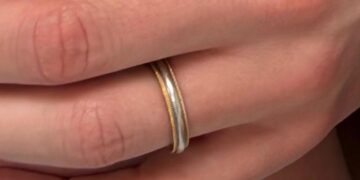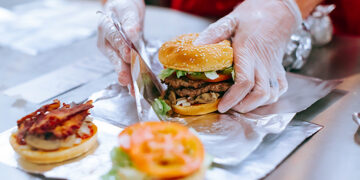All owners want to pamper their pets, especially at Christmas – but the festive season can pose some dangers for our four-legged friends.
PDSA Vets are sharing their top tips to ensure everyone has a safe and healthy Christmas.
From mince pies to stuffing, many festive favourites are poisonous and potentially fatal to our furry friends.
If you’re hoping to have your dog or cat join in with the festivities, PDSA Vet Nurse Shauna Walsh shares a homemade Christmas dinner recipe your pet will be sure to love!
Shauna said: “The best part about this recipe is that it’s incredibly easy to make and you can even use the leftovers from your own Christmas dinner!”
Ingredients:
65g of cooked turkey
10g of finely grated carrots
25g of diced green beans
60ml of water
25g of your pet’s dry food
Step 1: Throw all the ingredients into a blender or food processor – blend the mixture until it forms a puree texture.
Step 2: Add the mixture to a shape – find your favourite festive cookie cutter and fill with the mixture.
Step 3: When you are happy with the shape, move your mixture to the fridge. Allow to set for two to three hours.
Step 4: Once ready, serve (or save for later). You can keep your pet’s Christmas dinner in the fridge for about a week in an airtight container.
Shauna added: “This recipe is a great way for your pet to enjoy Christmas dinner safely. It’s designed to be fed in place of one or half of their regular meals (depending on their size)
“ But it’s not nutritionally balanced – so shouldn’t be a regular part of their diet.”
It’s important not to over feed your pet to avoid them piling on the pounds. If your cat or small dog is usually fed two meals a day, you can replace one of their meals with this recipe.
For medium and large dogs, if fed twice daily, you can replace half of one of their meals with this treat.
Shauna explained: “Lots of the foods we eat at Christmas are high in fat – so, while it may be tempting to include your pet for Christmas dinner, owners need to consider how much food their pets are eating, as gaining extra weight can be really unhealthy for our pets.
“Sudden diet changes can also cause vomiting or diarrhoea, so it’s best to stick to their normal food and regular mealtimes as much as possible. The key foods to avoid, as they are toxic to pets are:
Mince pies, Christmas cake, Christmas pudding and Panettone
“These all contain raisins and sultanas which can be highly toxic or even fatal to pets. If you’re indulging in a sweet treat or leaving a mince pie out for Father Christmas, make sure it’s out of paws’ reach to avoid any accidents.
Chocolate
“All types of chocolate are poisonous to dogs and cats – but the toxicity levels vary if it’s white, milk or dark chocolate. It can cause sickness and seizures, and can be deadly if eaten in high enough amounts. Pets, especially dogs, can sniff food out very quickly and may be tempted to wolf them down, so keep advent calendars, chocolate tree decorations and choc-filled gifts well out of paws’ reach!
Stuffing and gravy
“They both usually contain onions and garlic which can be deadly for cats and dogs.
Alcohol
“Alcohol can cause serious sickness for our pets, so if you’re enjoying a tipple be mindful where you leave your glass, and be sure to mop up any spills before your pets lick up the mess!
Bones
“They can easily splinter when they’re chewed and can seriously damage your pet’s throat or stomach or intestines. Bones can also cause blockages if they’re swallowed whole, so if you are cooking up a meaty Christmas dinner for yourself, make sure you throw any of the bones away where your pet can’t reach them.”
The festive food warning comes as December sees a peak in poisoning cases reported to the Veterinary Poisons Information Service with over a fifth (20.3%) of alcohol, 16% of grape and dried fruit and nearly 10% of onion, garlic, chives and leek cases all happening in that month.
PDSA has created a full Christmas Survival Guide, covering everything you need to be aware of, including decorative dangers, poisonous festive plants and how to keep the holidays stress free for your pet.
The guide is free to download from PDSA’s website at www.pdsa.org.uk/xmas-survival-guide.

















































